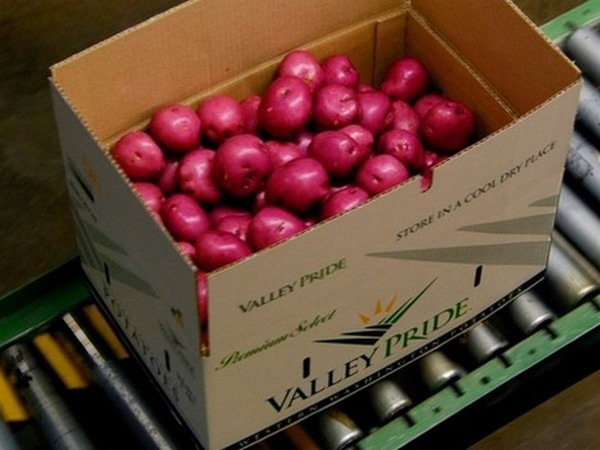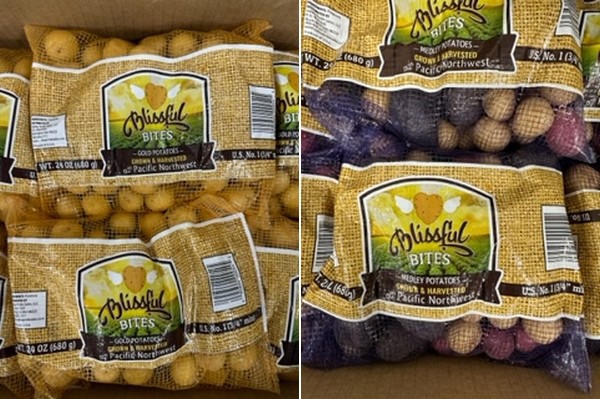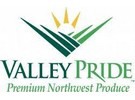There will be strong markets for potatoes in the next few years. That’s what Tony Wisdom Founder and CEO of Skagit Valley Farm and Valley Pride Sales thinks as he looks ahead to the 2023 potato season and beyond. This is especially so given the higher pricing currently seen on Russet potatoes. (Though the region of Skagit Valley specializes in growing colored potatoes.) “You like to see high prices as a producer,” says Wisdom. “As 2023 production comes online later this summer, Russet pricing may ease a bit but overall the market is going to stay fairly strong.”
It’s also a season that will see lower supplies, partly because of bad weather events in 2022 in both the spring and fall and in both the seed growing and the commercial growing regions. “On the seed side, that will have a ripple effect for a few years because if there’s no seed available, commercial growers don’t have the seed to plant a crop,” he says. Even looking at last year, the seed growers lost some seed and the crop they did produce was smaller because of that fall weather. “So they didn’t have as much seed to sell and this year there’s not as much seed to buy,” says Wisdom.
Add to that the increasing consolidation seen in the potato industry. “Some people just couldn’t make it through the weather events or high input costs have driven them out of the business,” he says. “Regulations in certain states are also becoming onerous so some are selling their assets while they have value. Washington for example has the most heavily regulated growing conditions and it’s getting really really hard to be in ag here.”

Moving away from potatoes
Following those challenging weather conditions, some growers may also switch to alternative crops with reduced risk--think soybean or corn in the Midwest. “That also means there’s just going to be less production in the next few years too,” Wisdom says.
However for Skagit Valley Farm, where it is seeing growth is in its mini potato program which is heading into its fifth year. This program has seen consistent growth year over year and Wisdom doesn’t see that stopping. Its mini potato acreage this year is double where it was three years ago for example.
“Demand for small potatoes is staying strong--it’s unique because it’s still new. It’s easier to work with and takes less time to cook so it’s convenient,” he says.
On the supply side, it’s also a very difficult product to grow and Skagit Valley Farm treats it as a separate commodity from its other potatoes with different equipment, seed, management techniques, harvesters and more. “It’s just a totally different beast and it’s very difficult to get into as well,” he says.

Consistent pricing
Pricing on mini potatoes is also steady. “Those of us doing it have figured out where the price point needs to be with our retail partners. It’s not the swings you have with regular-sized potatoes because there are so few quality producers of the mini product,” Wisdom says.
That said, the grower-shipper, as are most growers across the country, continues to look for more efficient ways to run its operations. Skagit Valley Farm recently consolidated its packing operations into an expanded facility--one that went from 70,000 to almost 100,000 sq. ft. for receiving, washing, packing and shipping potatoes. “We also have all of our human capital and talent on the packing side in one building which helps us be more efficient,” says Wisdom.
It’s also increasingly moving into automation. This season, its electronic state-of-the-art sizing and sorting equipment comes online as well as its robotic palletizing operations. It’s also currently testing proximity-sensing forklifts in its operations, which should also be in place in the next few years.
“We’re trying to automate as much as possible to gain efficiencies because it’s a tough labor market,” Wisdom says. “We have a hard time finding labor and the labor we do find costs more every year so if we can switch to automation at an affordable rate and pace, we’re doing that.”
 For more information:
For more information:
Tony Wisdom
Skagit Valley Farms and Valley Pride Sales
Tel: +1 (360) 428 2717
tony@skagitvalleyfarm.com
